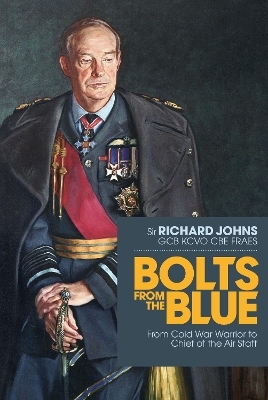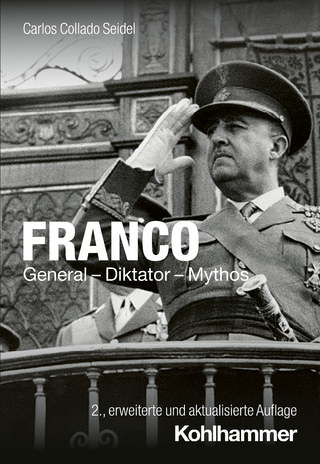
Bolts from the Blue
From Cold War Warrior to Chief of the Air Staff
Seiten
2018
Grub Street Publishing (Verlag)
978-1-911621-09-6 (ISBN)
Grub Street Publishing (Verlag)
978-1-911621-09-6 (ISBN)
Richard Johns' illustrious career gave him the privilege of a rare, if not singular, perspective of the RAF, our sister services and national defence matters
Air Chief Marshal Sir Richard Johns was commissioned at the Royal Air Force College Cranwell in 1959 after completing flying training on Piston Provost and Meteor aircraft. For the next nine years, apart from a short intermission as an ADC, he served as an operational fast-jet pilot which included tours on Javelin night fighters and then fighter recce Hunters operating from Aden and Oman. Thereafter he qualified as a flying instructor, initially on the Gnat, and then the Jet Provost as a squadron commander at Cranwell. In his last year as a flying instructor he taught The Prince of Wales to wings standard.
During the 1990s, Sir Richard held a succession of senior national and NATO appointments. During the first Gulf War, he was the Director of Operations in the National Joint Headquarters for all British Forces deployed to the Middle East. At the end of the conflict he led the British Recce Team to Turkey and north Iraq which resulted in the deployment of British land and air forces to the coalition that guaranteed the security of the Kurdish population in Iraq. Later, as a NATO C-in-C he was responsible for training and bringing to full operational capability the new Regional Command of Allied Forces, North West Europe. During this three-year tour, he acted as a supporting commander for joint operations in the Balkans while developing partnership for peace exercises with former Warsaw Pact countries.
He returned to national duty in 1997 on his appointment as Chief of the Air Staff, responsible for the operational efficiency and morale of the Royal Air Force. During his last three years of service, the Air Chief Marshal was fully involved in the decision-making process of the Strategic Defence Review, the commitment of RAF aircraft to operations over and within Kosovo and continuing air operations over north and south Iraq.
His illustrious career gave him the privilege of a rare, if not singular, perspective of the RAF, our sister services and national defence matters, witnessing a steady decline in the combat power of the UK’s armed forces as financial management took precedence over identifying strategic priorities and maintaining the vital skill-set of service personnel.
His views are forensic and forthright, balanced and thought-provoking and this autobiography should be essential reading for anyone interested in the development of Allied air power over the last fifty years.
Air Chief Marshal Sir Richard Johns was commissioned at the Royal Air Force College Cranwell in 1959 after completing flying training on Piston Provost and Meteor aircraft. For the next nine years, apart from a short intermission as an ADC, he served as an operational fast-jet pilot which included tours on Javelin night fighters and then fighter recce Hunters operating from Aden and Oman. Thereafter he qualified as a flying instructor, initially on the Gnat, and then the Jet Provost as a squadron commander at Cranwell. In his last year as a flying instructor he taught The Prince of Wales to wings standard.
During the 1990s, Sir Richard held a succession of senior national and NATO appointments. During the first Gulf War, he was the Director of Operations in the National Joint Headquarters for all British Forces deployed to the Middle East. At the end of the conflict he led the British Recce Team to Turkey and north Iraq which resulted in the deployment of British land and air forces to the coalition that guaranteed the security of the Kurdish population in Iraq. Later, as a NATO C-in-C he was responsible for training and bringing to full operational capability the new Regional Command of Allied Forces, North West Europe. During this three-year tour, he acted as a supporting commander for joint operations in the Balkans while developing partnership for peace exercises with former Warsaw Pact countries.
He returned to national duty in 1997 on his appointment as Chief of the Air Staff, responsible for the operational efficiency and morale of the Royal Air Force. During his last three years of service, the Air Chief Marshal was fully involved in the decision-making process of the Strategic Defence Review, the commitment of RAF aircraft to operations over and within Kosovo and continuing air operations over north and south Iraq.
His illustrious career gave him the privilege of a rare, if not singular, perspective of the RAF, our sister services and national defence matters, witnessing a steady decline in the combat power of the UK’s armed forces as financial management took precedence over identifying strategic priorities and maintaining the vital skill-set of service personnel.
His views are forensic and forthright, balanced and thought-provoking and this autobiography should be essential reading for anyone interested in the development of Allied air power over the last fifty years.
| Erscheinungsdatum | 07.10.2018 |
|---|---|
| Verlagsort | London |
| Sprache | englisch |
| Maße | 156 x 234 mm |
| Themenwelt | Literatur ► Biografien / Erfahrungsberichte |
| Sachbuch/Ratgeber ► Geschichte / Politik | |
| Geschichte ► Allgemeine Geschichte ► Zeitgeschichte | |
| Geschichte ► Teilgebiete der Geschichte ► Militärgeschichte | |
| Sozialwissenschaften ► Politik / Verwaltung | |
| ISBN-10 | 1-911621-09-2 / 1911621092 |
| ISBN-13 | 978-1-911621-09-6 / 9781911621096 |
| Zustand | Neuware |
| Informationen gemäß Produktsicherheitsverordnung (GPSR) | |
| Haben Sie eine Frage zum Produkt? |
Mehr entdecken
aus dem Bereich
aus dem Bereich
Gewalt, Umwelt, Identität, Methode
Buch | Softcover (2024)
Spector Books OHG (Verlag)
CHF 49,95


